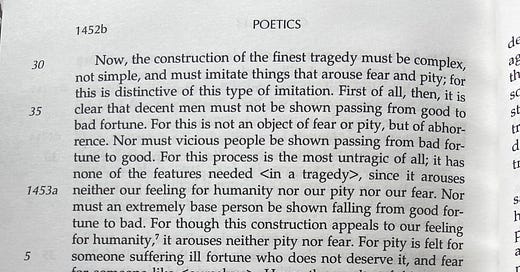I have this crazy deep internalised thing for Aristotle’s Poetics. It’s out of control. Greek Tragedy threatened to consume me when I was in high school because it came to me at my lowest point and offered me something to analyse and think about. Sophocles’ tragedies, in particular Electra, Antigone and Oedipus the King (or Oedipus Rex, whatever), were all I read for almost half a year.
I vividly remember running out of class, tears streaming down my face, and through the dizzying hallways of my school. I was sixteen. I stumbled into my Classics teacher’s classroom, gasping for breath. She didn’t necessarily offer me sympathy, but she did offer me space.
“Are you suicidal?” she asked me.
“No?” I told her. And she threw a book of Sophocles’ tragedies at me and said,
“Good, you can read Antigone.” I was still confused.
“I always have to check first. Read it, and you’ll understand.”
It’s tragic. Duh. Valid of her to check on my mental stability before I read it. I didn’t fall in love with Greek Tragedy, though, until I read Aristotle’s Poetics, a critical study of Greek drama that has given us SO MUCH insight into the purpose, structure and origins of the practice and has influenced the development of drama hugely since. It’s fucking dumb to be as attached to it as I am, especially since I’m not studying Classics or anything relevant to it anymore, but I really love it. I love how formulaic and scientific it is, in contrast to other ways of literary analysis. Aristotle analysed so many aspects of Greek society — ethics, science, politics, the list goes on — and he applied the same damn method to an exploration of poetry. How cool!!!?!?
I’m nerding out. Whatever it’s MY substack, I can do whatever I want. Anyway, the POINT is, Aristotle talks a lot about how tragedy should apply to our humanity, our feelings of pity and fear, and offer the audience a chance to reconcile/purge ourselves of these and walk away feeling lighter. Maybe you recognise this as catharsis. It’s also translated, at times, to ‘purification’ – which I kind of read as if tragedy/catharsis offers us a chance to become more than we are. Like we all have a weird masochistic urge to purge our emotions and feel FUCKING AWFUL before we find peace again. Such fun.
Aristotle discusses how, in tragedy, characters are secondary to the story; their actions are more important than themselves. And, he says, a character should be someone who passes into bad fortune through some ‘fatal flaw;’ some hamartia. Again, since Aristotle believes a character is not as important as the action of the story, this fatal flaw does not come from within the character himself but through a mistake for which the character is not blameworthy. Tragedy (concept) is not ACTED through character but ENACTED upon them, which makes the audience go, “that sucks! I feel sad now!” and move through that sensation of catharsis and purgation.
Interestingly, in Shakespeare’s The Tragedy of Julius Caesar, Cassius literally says, “The fault, dear Brutus, is not in our stars, but in ourselves”, which is super NOT Aristotelian of him. In part this is a reflection of the value of divinity across time which I won’t start thinking about because I already fear I am rambling and I don’t know enough about Caesar (play) to talk more about it! I only bring it up because I think it’s interesting that that line has now been remodelled into something more agreeable to Aristotle’s idea of tragedy recently in John Green’s The Fault in Our Stars.
Famously, I hate John Green, but hey, he’s here. (I just read through the Goodreads page for TFIOS quotes trying to find the following quote and was sickened by how much is in my brain and just eating me alive and is all I think about. “Some infinities are bigger than other infinities” tell me why I wrote a whole Summer of Love issue about that without realising that I was just regurgitating tragic heroine Hazel Grace the entire time. She talks about Aristotle, too. I’m going to be sick.) ANYWAY, Green writes in TFIOS that “it is the nature of stars to cross, and never was Shakespeare more wrong than when he has Cassius note, ‘The fault, dear Brutus, is not in our stars / But in ourselves.” Glad we’re on the same page. (Not. John Green is my #1 enemy. This is proof I read those books when I was way too young and impressionable, and now that’s all I am. Get me out of here.)
Whatever. I brought John Green and Aristotle here to remind myself that the enaction of tragedy upon us is beyond our control (not in a blameless sense but in a ‘I can only control how I react to the actions of others and the universe’ sense). I brought them here to remind (probably myself) that through tragedy, we reconnect to our humanity. It’s normal to slow down and move through pity and fear as we slowly creep towards catharsis and reconciliation. We’ll be pure and whole again soon. There’ll be peace soon. That’s it. That’s the silver lining of tragedy. (Unless it involves death, then the dead person probably never reaches catharsis. Idk. Ask Plato).
inthiscorneroftheworld i’m losing my marbles slowly but surely and this feels like a journal entry and i apologise for that but mmmm publishing makes soul feel happy and evil and like i’m moving towards catharsis because i can TALK about processing my emotions publicly… so i must be feeling them properly… and maybe yeah and maybe that’s dumb but as always thanks for being here. i hope you find peace soon <3 rooting for all of us. it’s brutal out there.





Inspiring! Love you and your hatred of John Green lol
i might have to go read aristotle now… love ur stuff :)